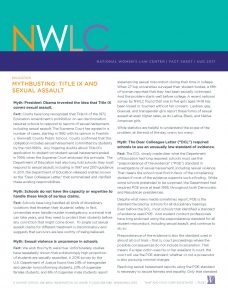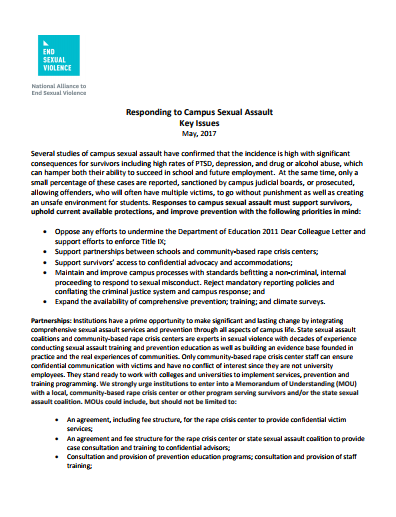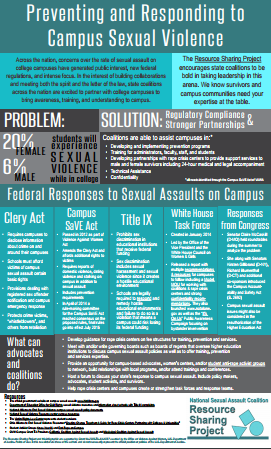Resources Library: Campuses
Start a Search:
Key Elements of Addressing Gender-Based Violence on Campus
All college students have the right to learn and live in an educational environment where they are safe and treated equally. This is the overarching spirit of federal and state legislation, like Title IX, governing campus gender-based violence response and prevention efforts. It is also a core belief of the Virginia Sexual and Domestic Violence Action Alliance and our partners on Virginia’s Campus Task Force.
This resource can be used as a starting place, or a set of benchmarks, for campus advocates, police, Title IX coordinators, and administrative staff and partners who are considering how Virginia's colleges and universities can engage in comprehensive, trauma-informed, and effective responses to gender-based violence.
The Virginia Sexual and Domestic Violence Action Alliance offers the following recommendations based on more than 35 years of work with students, campuses, community advocates and national leaders dedicated to building an effective response to gender-based violence and sexual assault.
National Women’s Law Center - Mythbusting Title IX and Sexual Assault

Nearly one in five undergraduate women experience sexual assault or attempted sexual assault while in college, as do too many men and gender non-conforming students. Title IX of the 1972 Education Amendments requires that schools prevent and respond to reports of sexual harassment, including rape, to ensure survivors can continue to learn in the wake of violence. Despite significant evidence to the contrary, some critics argue that survivors of sexual misconduct on college campuses have too many rights. Myths like these are inconsistent with the law and ignore the real experiences of students subjected to sexual harassment. Below are other myths and facts about sexual assault and Title IX.
Red Flag Campaign Relaunch Webinar

The Red Flag Campaign is an awareness campaign that educates college students about sexual assault, dating violence, and stalking by highlighting the warning signs, or “red flags,” that students may see in a friend’s relationship.
Through using a bystander intervention strategy, the campaign encourages friends and other campus community members to “say something” when they see red flags for dating violence such as emotional abuse, jealousy, isolation, victim blaming, coercion, stalking, microaggressions, and sexual assault.
Launched in Virginia in 2007, the Red Flag Campaign has since spread across the country to over 400 college campuses, military bases and academies, and community-based advocacy agencies in 48 states and Canada. It was created in partnership with college students, college personnel, and community victim advocates, and funded by grants from the Verizon Foundation, Verizon Wireless, Macy’s Foundation, and the Centers for Disease Control & Prevention.
The campaign includes a digital guide for implementation, miniature red flags for raising awareness in highly visible campus locations, and printed posters featuring active bystander responses to red flag statements. In 2022, Action Alliance staff began a process to create two new series of posters and revise the digital Campus Planning Guide to reflect current student experiences. This webinar shares the history of the campaign as well as the revision process and all of the new materials the campaign has to offer.
Click here to access the recorded session on these updates.
Responding to Campus Sexual Assault Key Issues (May 2017) from the National Alliance to End Sexual Violence

Several studies of campus sexual assault have confirmed that the incidence is high with significant consequences for survivors including high rates of PTSD, depression, and drug or alcohol abuse, which can hamper both their ability to succeed in school and future employment. At the same time, only a small percentage of these cases are reported, sanctioned by campus judicial boards, or prosecuted, allowing offenders, who will often have multiple victims, to go without punishment as well as creating an unsafe environment for students. Responses to campus sexual assault must support survivors, uphold current available protections, and improve upon prevention.
RSP Preventing and Responding to Campus SA Infographic

In this ReShape, the Resource Sharing Project created an infographic for coalitions about federal rules and regulations around campus sexual assault.

